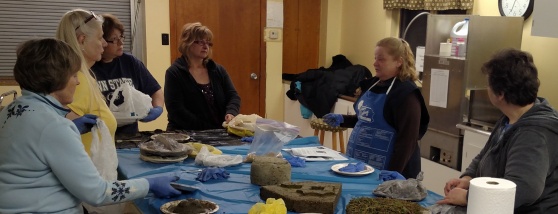One of the areas we’ve focused on as a diocese is collaboration, and more specifically, how pooling our resources and talents can lead to adaptive change not only in the church, but in our communities for the greater glory of God. While this can take several forms, one obvious area for change is outreach.
We’re fortunate in our diocese to have several congregations who’ve come together to increase the impact of their ministry. For this series, we’ll focus on the Snack Pack outreach project, a collaboration between St. Stephen’s in Fairview and St. Mark’s in Erie to aid youth attending the Erie Charter School of Excellence.
One might ask: Why pick a charter school to partner with for an outreach project? Generally charter schools aren’t thought of as institutions in need of aid, but this particular school and its target demographic are an exception to the rule. From the CSE website:
The Charter School of Excellence initially opened its doors for students on August 26, 2003 for the school year 2003-2004. The school serves students in grades six through twelve from the Erie, Pennsylvania region. Although any student can attend the charter school, the school’s focus is directed toward those students who have had significant difficulties with academic performance in their previous school settings.
As Carly Rowe of St. Mark’s puts it, “These are kids who for whatever reason wouldn’t have made it in the public system.” CSE has a high refugee and English as a second language population, which seems unusual until you consider that, as of May 2017, Erie’s mayoral office estimated that roughly 18% of the city’s population comprises refugee families from countries like Syria, Bhutan, and Iraq, among others. Besides students facing language and cultural barriers, there is also a subset of teen mothers and roughly 30% of CSE students are considered homeless or under housed.
With all the obstacles these students work through on a daily basis, the uncertainty that they will get a meal at home only compounds the difficulty of trying to concentrate in school. Part of providing a recipe for success at CSE is making sure their students have regular meals. Breakfast and lunch are served each school day, but, when it comes to weekends, the school has little control. This is where the Snack Pack outreach program steps in: St. Mark’s and St. Stephen’s have teamed up with the Second Harvest Food Bank to create food packets that are delivered to students two Fridays a month so they have food at home over the weekend. Church volunteers pick up the food from Second Harvest, pack individual bags (along with supplemental items donated by members of both congregations), and volunteers who have passed both Safe Church and school district clearances take the bags to the school and deliver them to students.
While getting food to the students is the basis of this particular outreach project, the hands-on delivery by the volunteers has had an added benefit: the building of relationships between church volunteers and the school faculty and administrative personnel. As the volunteers have become a known quantity in the building, the faculty find it easier to speak with them directly and share additional student needs that may not have been communicated otherwise, which has led to an expansion of the outreach ministry. As a result of speaking with teachers about student needs, St. Mark’s now supplies a hygiene pantry at the school, where church members donate items like toothpaste and soap that are available at the school for students to take what they need. One member of the St. Mark’s congregation is using her talents as an extreme couponer to purchase additional hygiene products to supplement the donations, which stretches the purchase power of outreach dollars while simultaneously creating an opportunity for members who aren’t available on delivery days to participate in the project. The Snack Pack program has also grown to include a packed lunch service that takes place during the school’s summer program – last summer St. Mark’s provided 75 bagged lunches two times a week for four weeks, which covered half of the CSE summer session.
Earlier this winter, teachers also made the Snack Pack volunteers aware that several of the students didn’t have appropriate outerwear for Erie weather. With this in mind, the collection taken at Diocesan Convention was earmarked to purchase coats for CSE students. Bishop Sean matched the dollar amount collected at the convention Eucharist service and, with the combined funds, over 100 coats were purchased and donated for students who would otherwise have gone without.
It’s sometimes difficult to see the impact of a ministry once the donations have been sent to their destination, but in this video, produced by Charter School of Excellence students, you can see firsthand the kind of impression this program is making:
In our next segment of Feeding the Future, we’ll discuss the issues of long term ministry sustainability, growing ministry from strictly outreach into relationships, and the continued impact that this ministry has on both the church and the community. Stay tuned!



